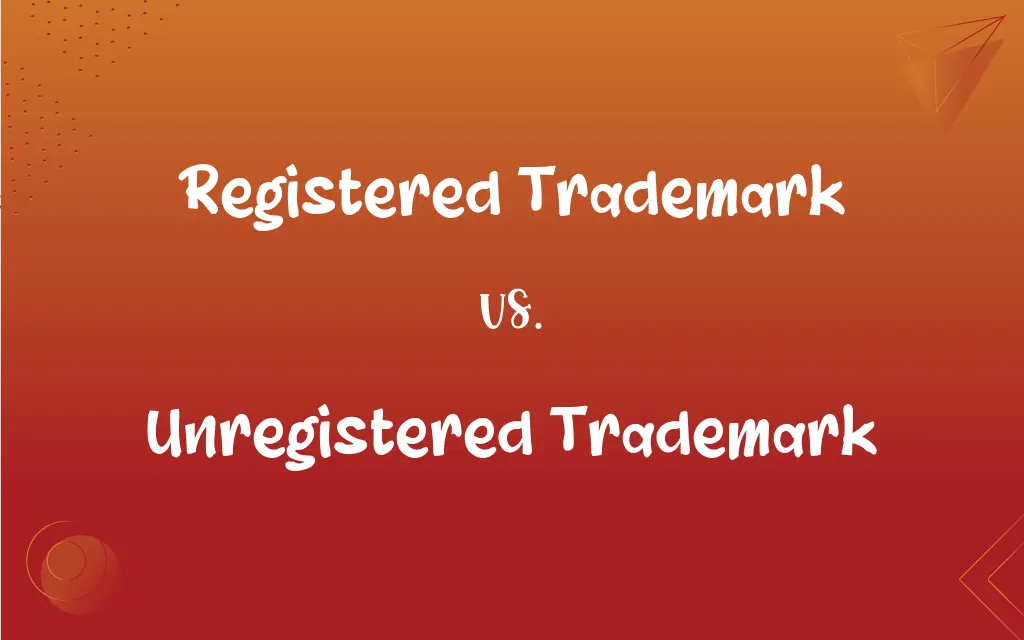Registered Trademark vs. Unregistered Trademark: What's the Difference?
Edited by Harlon Moss || By Janet White || Published on November 10, 2023
A Registered Trademark has been officially recognized and protected by law, while an Unregistered Trademark hasn't undergone formal registration but might still have some common law rights.

Key Differences
A Registered Trademark is a symbol, word, or phrase legally registered or established by use as representing a company or product. Once registered, it provides the owner exclusive rights to the trademark, preventing others from using it without permission. This exclusivity is vital in branding and establishing a unique market presence. On the other hand, an Unregistered Trademark is one that isn't formally registered with the trademark authority but is used by a business or individual in commerce. Even though it hasn't been officially registered, it may still carry certain rights under common law.
While both a Registered Trademark and an Unregistered Trademark serve as marks of trade, their legal protections differ. The owner of a Registered Trademark can legally enforce their trademark rights and prevent unauthorized use by others. This enforcement includes taking legal actions against infringers and seeking damages. An Unregistered Trademark, while not enjoying the same extent of protection, may still have some protection under common law based on the use and recognition in commerce.
The process of obtaining a Registered Trademark involves filing an application with the trademark office, ensuring the mark is unique, and waiting for the official approval. This process provides a public record of the trademark and guarantees certain legal protections. In contrast, an Unregistered Trademark doesn't require any official procedure or fees. However, it relies on the "first to use" principle in many jurisdictions, which can give rights to the original user.
Symbols typically represent the status of trademarks. A Registered Trademark often uses the ® symbol, indicating it has been formally registered and protected by law. Conversely, an Unregistered Trademark might be associated with the ™ symbol, which implies it's being claimed as a trademark but hasn't undergone the formal registration process.
Comparison Chart
Legal Protection
Full legal protection and enforceable rights
Limited common law rights
ADVERTISEMENT
Registration Process
Requires formal application and approval
No official registration required
Symbol
Uses the ® symbol
Uses the ™ symbol
Enforcement
Can legally prevent unauthorized use and seek damages
Relies on common law and "first to use" principle
Duration of Rights
Lasts as long as it's renewed and in use
As long as it's used and recognized in commerce
Registered Trademark and Unregistered Trademark Definitions
Registered Trademark
A symbol, word, or phrase legally recognized to represent a company or product.
The logo with the ® symbol indicates it's a Registered Trademark of the company.
ADVERTISEMENT
Unregistered Trademark
A mark that may have rights based on its use and recognition in trade.
Even as an Unregistered Trademark, the brand's logo is widely recognized in the city.
Registered Trademark
A trademark that provides the owner with exclusive rights.
With a Registered Trademark, the brand can take legal action against infringers.
Unregistered Trademark
A symbol, word, or phrase claimed as a trademark but not officially registered.
Brand Y uses a unique logo as an Unregistered Trademark for its products.
Registered Trademark
A mark that has undergone official registration and is protected by law.
Brand X secured its unique logo as a Registered Trademark, preventing imitation.
Unregistered Trademark
A sign that hasn't undergone the official trademark registration process.
The brand chose to operate with an Unregistered Trademark to avoid registration fees.
Registered Trademark
A mark indicating unique branding recognized and protected by governmental authorities.
The company's Registered Trademark sets it apart in a crowded market.
Unregistered Trademark
A trademark relying on the "first to use" principle for its rights.
Their Unregistered Trademark, used for years, gave them some claim over newcomers.
Registered Trademark
A sign that has been approved by the trademark authority.
After months of waiting, their brand name became a Registered Trademark.
Unregistered Trademark
A mark used by a business in commerce without formal registration.
The logo with the ™ symbol indicates it's an Unregistered Trademark of the brand.
FAQs
How do you obtain a Registered Trademark?
By filing an application with the trademark office, ensuring uniqueness, and receiving approval.
Is there a symbol to indicate an Unregistered Trademark?
Yes, the ™ symbol typically indicates an Unregistered Trademark.
Can an Unregistered Trademark be legally enforced?
An Unregistered Trademark has limited common law rights and relies on the "first to use" principle for enforcement.
What is a Registered Trademark?
A Registered Trademark is a mark legally recognized and protected by law to represent a company or product.
Can I use the ® symbol with an Unregistered Trademark?
No, the ® symbol is reserved for marks that have been officially registered.
What protections does a Registered Trademark offer?
It offers full legal protection, enforceable rights, and can prevent unauthorized use.
Do I need to renew a Registered Trademark?
Yes, a Registered Trademark needs periodic renewal to maintain its rights.
How long does it take to register a trademark?
The time varies but can take several months to years, depending on the jurisdiction and potential objections.
Do all countries recognize a U.S. Registered Trademark?
No, trademark rights are territorial. A U.S. Registered Trademark doesn't automatically grant rights in other countries.
Can an Unregistered Trademark become registered?
Yes, by applying and going through the official trademark registration process.
Does an Unregistered Trademark have any rights?
Yes, it may have common law rights based on its use and market recognition.
Are there fees associated with maintaining a Registered Trademark?
Yes, there are renewal fees to maintain the rights of a Registered Trademark.
What's the symbol for a Registered Trademark?
The ® symbol denotes a Registered Trademark.
Can I sell or license a Registered Trademark?
Yes, Registered Trademarks can be sold, licensed, or transferred to other entities.
Do I always need an attorney to register a trademark?
While not mandatory, hiring an attorney can help navigate the complexities of trademark registration.
What happens if I use someone else's Registered Trademark without permission?
You risk legal action, including potential damages and injunctions.
Can I oppose someone registering a similar trademark?
Yes, if you believe a new application infringes on your Registered or even Unregistered Trademark, you can oppose it.
How do I know if a trademark is registered or unregistered?
Check for the ® (registered) or ™ (unregistered) symbols, or search in the official trademark database.
Can I use an Unregistered Trademark freely?
Not necessarily. Even an Unregistered Trademark may have rights, and unauthorized use can lead to disputes.
Is registration the only way to protect a trademark?
No, while registration offers robust protection, Unregistered Trademarks can have protection under common law based on use and recognition.
About Author
Written by
Janet WhiteJanet White has been an esteemed writer and blogger for Difference Wiki. Holding a Master's degree in Science and Medical Journalism from the prestigious Boston University, she has consistently demonstrated her expertise and passion for her field. When she's not immersed in her work, Janet relishes her time exercising, delving into a good book, and cherishing moments with friends and family.
Edited by
Harlon MossHarlon is a seasoned quality moderator and accomplished content writer for Difference Wiki. An alumnus of the prestigious University of California, he earned his degree in Computer Science. Leveraging his academic background, Harlon brings a meticulous and informed perspective to his work, ensuring content accuracy and excellence.







































































